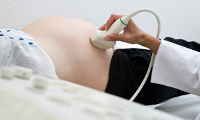When To Call The Doctor
Things You Shouldn't Ignore During Your Pregnancy
| Share: | Tweet | Thank You! |
 Pregnancy is full of new sensations, new experiences and lots of new emotions. Even if it isn't your first baby, every pregnancy is different and you may be facing challenges this time around that you would have never dreamed would come your way. So when you ask your friends "is this supposed to happen?" they may not know either, and getting incorrect information could be dangerous for you and your baby.
Pregnancy is full of new sensations, new experiences and lots of new emotions. Even if it isn't your first baby, every pregnancy is different and you may be facing challenges this time around that you would have never dreamed would come your way. So when you ask your friends "is this supposed to happen?" they may not know either, and getting incorrect information could be dangerous for you and your baby.Knowing when to contact your doctor about an issue or problem may be difficult to determine, and if you are ever unsure, err on the side of caution and contact your doctor or midwife for help. It is also a good idea on your very first visit to your health care provider to find out exactly what symptoms he or she wants to be notified about, and ask what you can expect in the upcoming weeks. Most doctors may only see you once per month during your first trimester, and part of your second - and a lot can change in a month. Make a list of what they tell you, or take a friend to help you remember what your doctor says. The office may also provide handouts or other printed information for you to take with you, so don't be afraid to ask. Every doctor will be different, so remember to follow your gut instinct and what your provider says above any other recommendations.
First Trimester (Weeks 1-13)
Many women don't even know that they are pregnant for the majority of their first trimester. Usually, by the time you miss your period, you are considered to already be about 4 weeks along. Many moms-to-be are very concerned about things they may have done before they knew they were pregnant-like had a drink or two, smoked, or even used street drugs. Thankfully, research shows that the implanted egg is actually resistant to dangerous chemicals for about the first 7 weeks, and usually suffers no harm from anything you may have done before you knew about your little bun in the oven.
Other complications that may arise during your first weeks can vary, however this is the time that most miscarriages occur. Of course, miscarriages and fetal death is one of the most tragic events a mother can ever go through - and there's typically not a thing that anyone could have done to stop it. Symptoms of a miscarriage can include painful menstrual-type cramping, and bleeding. The further you are along in your pregnancy that you may be, the more difficult it can be for you to complete the miscarriage without your doctor's help.
Bleeding or spotting of any color, type, or amount should be evaluated by your doctor or midwife. Not all bleeding is a sign of a miscarriage. Other issues, like a low-lying placenta may also cause bleeding and this typically resolves after some rest and a little time.
Abdominal pain after a positive pregnancy test should also be evaluated. Some complications, such as an ectopic or molar pregnancy can put mom's life in danger. Any pain should be discussed with your doctor.
Chronic or long standing health conditions like diabetes, heart valve diseases, or genetic disorders could greatly impact your ability to safely carry a baby. You should talk with your doctor before getting pregnant to evaluate your ability to safely conceive and carry your baby to term. Your doctor may also want to see you more frequently, and may recommend obstetric specialists for your particular needs to make sure everyone is safe.
Second Trimester Tests (Weeks 14-26)
Infections are common during pregnancy. Your rapidly changing body causes many organs and other structures to change position, and function. Because of this, many types of infections can develop that should be treated as soon as you notice symptoms. Urinary tract infections are one of the most common for pregnant women. Urinating frequently (aside from the first trimester hormone-related frequency) that is accompanied by burning, difficulty starting or stopping your stream, abdominal pain, and fever should be treated.
Preterm labor can also occur during your second trimester. While some babies who are born during the last weeks of the second trimester do survive, the complications and long-term effects can be serious. For this reason, any cramping, abdominal, or back pain (no matter how mild), bleeding, gushes or trickles of fluid, or change in your baby's movement should be reported and evaluated immediately.
Third Trimester Tests (Weeks 27-40)
Your final weeks of pregnancy are likely to be your busiest. After your 28th week, you will begin seeing your doctor more frequently - usually every two weeks until around week 36 or so when you will begin going weekly. Symptoms to report to your doctor during your last trimester include everything listed above, as well as a few others. Of course, symptoms of labor, pain, decreased fetal movement, gushes of fluid, or bleeding are obvious-- but there are a few others that may not show themselves until now.
Swelling gets every pregnant woman at some point. For some, it's earlier in their pregnancy than for others. However any swelling should be evaluated to make sure you aren't developing a condition known as preeclampsia. Preeclampsia can be a serious medical condition for mom and baby because it is directly related to high blood pressure. Any chest pain (usually occurring between the breasts, over the sternum), headache, nose bleeds, or abdominal pain (on the upper right side just below the ribs) should be reported to your doctor immediately.
Injuries are also common as swelling bellies cause a change in your center of gravity. You may think that you can navigate the same challenges you could before, but it can be easy to lose your balance (stairs are a common problem for pregnant women) and fall. Automobile accidents that cause you to come into forceful contact with another object (including a seat belt) should be evaluated in the Emergency Room or on your labor and delivery unit as soon as possible.
| Share: | Tweet | Thank You! |
Read & Learn More:
 The Needle's Edge - A Breakdown of Prenatal Testing |
 Pregnancy Weight Gain How much weight should I gain during my pregnancy? |
 Food Techniques For Nausea In Pregnancy |


 Community
Community




